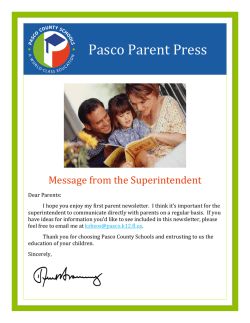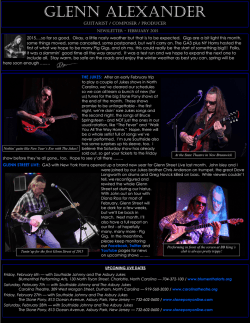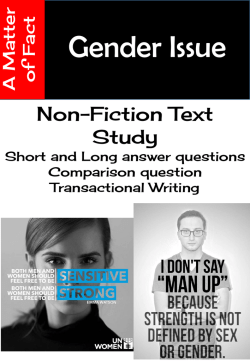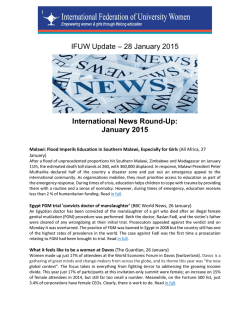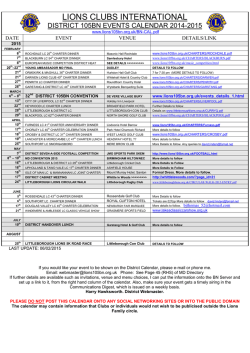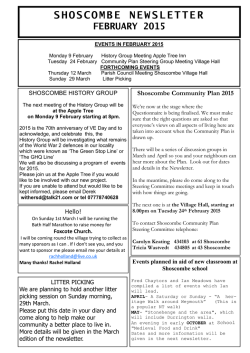
newsletter - Equalities in Education
newsletter The professional body of equality and diversity practitioners IEDP newsletter number 34 In this issue: Dates, deadlines and reminders page 1 New Year reflections by Denise Rabor page 2 Reading your Roots project page 3 Diversity calendar by Yasmin DamreeRalph pages 4 - 5 New EHRC resources on human rights for children and young people page 5 New IEDP board member page 6 Research study on disabled entrepreneurs by Eva Kašperová page 7 TUC’s charter for Racial Justice in Education by Leander Neckles page 8 Account of the most recent Board meeting by Ruth Wilson page 9 IEDP accreditation dates If you are quick you still have time to apply for the next round of IEDP accreditation. The date for expressions of interest is 31 January. You would need to confirm and pay by 13 February and submit your portfolio by 27 March. Further details on our website January 2015 Still time to apply for the role of IEDP Chair As mentioned in our last newsletter the deadline for applications for the role of IEDP Chair has been extended until Friday 30 January 2015, as we found that our advertisement did not reach as many people as we had intended. The key competencies for the role are available on the events page of the IEDP website at http://www.iedp.org.uk/ events/view/the-iedp-is-currently-seekingto-recruit-a-new-chair If you wish to apply please send a CV to our office by 30 January 2015. Shortlisting and interviews will take place in early February. This is an unpaid voluntary position for three years starting in March 2015. The role involves chairing the IEDP Board and leading it in its aspiration to develop a more strategic approach to setting and implementing the aims and objectives of the IEDP. Don’t forget to renew your IEDP membership - your annual subscription was due on 1 January newsletter New year reset - new year refocus By Denise Rabor So here we are in a brand new year - it's 2015 and we are 15 years into the new Millennium - imagine, 15 years! There were so many dreams, aspirations and goals surrounding the millennium, and of course many of those revolve around equality, diversity and inclusion. For example according to the Gender and Race Benchmark 2014 women and Black Asian Minority Ethnic (BAME) employees are less likely to be identified as ‘high potential’ or be selected for leadership training overall see more here Organisations have been very focused on making sure that they have policies and procedures that cover diversity and inclusion but the challenge is making sure that these policies are fit for purpose and don't become mere ‘tick box exercises'. Here are some goals for leaders to consider for 2015: It has been an impressive few years, with a Leaders need to understand the need to growing clamour for accountability in model the desired behaviours. It really is organisations globally for improved diversity pointless having policies that the and inclusion policies in relation to all leadership don't buy into. groups, helped along by the game changing 'Unconscious bias' is a major stumbling 2010 Equality Act, which aimed to eliminate block to successful and sustainable virtually all forms of discrimination that had diversity and inclusion policy been lingering in dark corners. Yay! implementation. Perhaps offer workshops that highlight biases and challenge people Diversity has become more visible thanks to to consider how they affect their the Act, as well as the work done by behaviours and decisions. organisations like the IEDP and The Equality and Diversity Forum. We've also witnessed a Leaders need to be transparent about the value they place on these policies and surge in award schemes aimed at individuals then need to incorporate them into their and organisations who excel in this area, business strategy, with clearly defined, pushing the barriers and taking the lead in time limited goals. Ultimately if diversity organisational culture change, most and inclusion are part of the mission and recently The National Diversity Awards. And vision, they will eventually become part of of course we can't forget social media which the organisation’s DNA. has also become an incredibly powerful ally. Having diverse teams all the way to leadership level will impact positively on So while there is much to feel pretty good your organisation’s bottom line. about on the diversity landscape, it is the New Year and with that comes the need to Don't judge those who try and fail, judge not just reflect on our accomplishments but those who fail to try more importantly to look at where we need Anonymous to intensify our efforts and set goals for the year ahead. Denise Rabor is the IEDP’s newest board member (see page 6) 22 newsletter Reading your Roots to share poems they loved, or in some cases had written themselves. I was lucky enough to attend one of these and found it a very positive occasion, thought-provoking and, at times, very moving. By Ruth Wilson At the beginning of February an interesting and innovative project is getting off the ground in Birmingham run by The Hearth Centre, an organisation which aims to harness the transformative power of the arts and use professional theatre to trigger discussion about how services can be changed or improved. The Hearth Centre also produced an anthology of poetry from the Reading for Well-Being project, called ‘Turning the Page.’ The Hearth Centre was set up in 2003 by its Artistic Director Polly Wright, who is a theatre director, performer, facilitator, writer, lecturer and performer. The Reading your Roots project builds on earlier work done by Polly in association with her colleague, poet and children’s writer and editor Mandy Ross, using poetry and short stories in mental health settings. This earlier scheme, Reading for Well-being, involved training current or former mental health service users in reading aloud poetry and short stories. The trainees were then placed in mainstream settings such as libraries and community centres, to use the readings as catalysts for discussions with people about mental health issues. The idea was for people to be encouraged to make links between the poetry or stories and their own experience, and through this process promote better understanding of mental health, both for the participants and in the community. The Hearth Centre now has Awards for All funding to run the Reading your Roots Project, which uses the same model but is specifically about reading stories and poems translated from different languages and exploring the experience of diaspora. The Hearth Centre will be providing a free training course which will cover: Setting up a Reading your Roots group Choosing reading materials Reading aloud skills Facilitating group discussion Stories and poems translated from different languages. Starting points include Rumi, Faiz, Anita Desai, Miroslay Holub, Imtiaz Dharkar and Daljit Nagra. The course lasts for five half days and participants will need to attend all five. It will run from 10 am to 1 pm on Monday 2 February, and Tuesdays 10 February, 3 Funded by the ‘Time to Change’ initiative, March, 10 March and 17 March. The this project was very successful and organisers are keen to attract participants culminated in two events, one at the who are bilingual, speak English well and Birmingham Rep and the other at the would be keen to set up a group within a Midlands Arts Centre, called Poem in your community setting. Pocket. These consisted of the mental health service users involved in the project Email [email protected] if you reading some of their favourite poems in are interested or can help by suggesting the first half, with an ‘open mike’ in the suitable places to advertise the course. second half for members of the audience 3 3 newsletter Diversity calendar: January and February 2015 27th January Holocaust Memorial Day Day of remembrance for the victims of the Holocaust and of other genocides. The 2015 theme is ‘Keep the memory alive’. www.hmd.org.uk By Yasmin Damree-Ralph This year the IEDP newsletter is introducing a new feature - a diversity calendar of the current and forthcoming month. Let us know what you think... February is: January is: Cervical Health Awareness Month Celebration of Life Month National Glaucoma Awareness LGBT History Month World Cancer Awareness Month Youth Leadership Month 12 February Darwin Day 11 January The idea of International Human Trafficking Awareness Day Darwin Day is to inspire Human Trafficking people throughout the Awareness Day globe to reflect and act began in the USA in on the principles of 2007 and is intellectual bravery, dedicated to raising perpetual curiosity, scientific thinking, and awareness of sexual slavery and human trafficking worldwide. Although originally hunger for truth as embodied in Charles Darwin. http://darwinday.org a U.S. initiative, the United Nations has begun to highlight this topic and to work towards global awareness. 14 February Valentine’s Day Each year on February 14, many people exchange cards, gifts or flowers with their special ‘valentine.’ The day of romance we call Valentine’s Day is named after a Christian martyr and dates back to the 5th century, but has origins in the Roman holiday Lupercalia. 18 January World Religion Day The third Sunday in January is annually celebrated as World Religion Day. Followers of every religion are encouraged to acknowledge similarities between different faiths. www.worldreligionday.org 15 February Nirvanna Day An annual festival celebrated on 15 Feb by some Buddhists that remembers the death of the Buddha when he reached Nirvana at the age of 80. It is also known as Parinirvana Day. http://buddhism.about.com/od/ 19 January Martin Luther King Day Celebrating the memory and legacy of the American civil rights campaigner. 4 4 [continued on page 5] newsletter Diversity calendar [continued from page 4] 17 February Shrove Tuesday / Pancake Day The day before the beginning of Lent, which is celebrated in many countries by a feast. Lent is observed by many Christians, including Anglicans, Lutherans, Methodists and Roman Catholics. Like many European traditions Pancake Day was originally a pagan festival. 18 February Ash Wednesday A day of fasting, Ash Wednesday is the first day of Lent in Western Christianity. It occurs 46 days (40 weekdays plus 6 Sundays) before Easter. 19 February Chinese New Year The date of Chinese New Year is calculated according to the Chinese lunar calendar, hence the date is different each year on the Gregorian (internationally used) calendar, but always in the period January 21 to February 20. Chinese New Year 2015 will be the year of the goat. For people born in the year of the goat (1919, 1931, 1943, 1955, 1967, 1979, 1991 and 2003), 2015 is considered an auspicious year. They are honest, intimate, and can be easily moved by the misfortune of others... Read more on the personality, career, and love suggestions for those born in the year of the goat and other Chinese zodiac animals here 20 February World Day of Social Justice Social justice is an underlying principle for peaceful and prosperous coexistence within and among nations. We uphold the principles of social justice when we promote gender equality or the rights of indigenous peoples and migrants. We advance social justice when we remove barriers that people face because of age, class, culture, disability, ethnicity, gender, gender identity, race, religion or belief, or sexuality. Click here for further Information about the World Day of Social Justice. New Online Resource for Children and Young People On International Human Rights Day (10 December) the Equality and Human Rights Commission launched a new online resource for children and young people - to learn about the United Nations Convention on the Rights of the Child (CRC). The aim of their Plain English factsheets and video animation is to inspire young people to learn about their human rights, and how they can be involved when the UK Government is next reviewed by the UN Committee on the Rights of the Child. Click here for more details. ‘Goats’ are said to like to be in groups. 5 newsletter Welcome to our new Board Member Management Institute (MCMI) and the Recruitment and Employment Confederation (REC). Having spent a lifetime in business, the one thing that I'm certain of is that there is a sad lack of diversity in all sectors and particularly in leadership. It's fascinating to me that although the world is becoming a smaller place thanks to international trade, travel and social media etc., the people who keep businesses going are not represented in the leadership and governance of those businesses. The IEDP Board is pleased to welcome Denise Rabor, who joined us in January. Denise is an advocate, facilitator and expert on (female) leadership, entrepreneurship, human resource development and women in business, with a specific emphasis on diversity. She has also lectured in leadership and management. I love the fact that I see clear linkage between the aims and objectives of the IEDP and my work and life experience; this is especially true of the goal to promote equality in professional practice, with an emphasis on increasing dignity, respect and choice in business, the workplace and society as a whole. I believe that this is the only way to create truly diverse leadership in business. As an entrepreneur she has over 25 years business experience in the health and social care, recruitment and beauty sectors. She is joint Chief Executive Officer of a private sector care home business and more recently is the founder of Leadership3sixty, a website dedicated to diversity in business. She is an Associate of the Chartered Institute of Personnel and Development (CIPD), a Member of the Chartered Could you help the IEDP? Do you have experience and expertise in marketing and branding? As part of the IEDP’s business plan we would like to review and update our branding and marketing and would welcome any help that you could give us on a voluntary basis. You would not necessarily need to join the Board, but we would welcome any advice, support or ideas that you could offer. Please contact the IEDP office if you can help - or pass on this request to anyone else you know who might be able and prepared to support us in this way. Thanks! 6 newsletter Research study on Disability and Entrepreneurship participants will receive an executive summary of the findings and I will credit those who wish to be acknowledged. How you may be able to help Taking part in the study involves a face-toface interview lasting approximately one All self-employed people hour. You will be asked several questions need access to resources and market about your personal and business opportunities in order to start and operate background, motivations for becoming a business successfully. This study looks self-employed, any barriers you may have specifically at how people with different faced in setting up and running a impairments and health conditions build business and your experiences of relationships with customers, employees interacting with customers and others. and finance providers, to gain this access. With your permission, I will audio record the interview so that I do not have to Relevance of the study make many notes. You have the right to Disabled people are more likely to withdraw from the study at any time become self-employed than the working without giving a reason. population as a whole, yet they are under-represented in business research Ensuring confidentiality and anonymity and policy. The study examines individual Your responses to the interview questions motivations for entering self-employment, will be kept confidential. The audio the barriers to accessing resources such recording of your interview will be as information, advice and finance, and transcribed, all the data will be stored the experiences of business support. In securely on the Kingston University server, this project I hope to: and the recording will be erased on provide independent research into start completion of the study. Some of your -up and management experiences of anonymised quotes may be used in people with various impairments and publications, but at no time will your health conditions actual identity be revealed. Give a voice to disabled people in business research and policy-making If you are interested in taking part please Generate new role models for aspiring contact me on 020 8417 5463 or email entrepreneurs. [email protected] By Eva Kašperová Outcomes One of the outcomes will be to draw out practical implications that may be of value to disabled people, policy-makers and support organisations. On completion, the findings will be available in accessible formats and disseminated through conferences and publications. All study Thanks to the Jane Hunt from the Association of Disabled Professionals for drawing the IEDP’s attention to Eva’s research. The ADP advises disabled people thinking about setting up their own businesses and growing their business, see www.adp.org.uk www.startability.org.uk 7 newsletter The TUC’s Charter for Racial Justice in Education and the Race Equality Charter Mark for Higher Education By Leander Neckles The Charter for Racial Justice in Education The TUC launched the Charter for Racial Justice in Education in March 2014 in part because ‘despite many years of equality legislation, racism in education still limits opportunities for many.’ The Charter is designed to ‘bring together the longstanding concerns of parents, students, teachers, academics and the wider community and acts as a set of demands for educational institutions.’ The Charter can be located on the TUC’s website together with additional information on how it can be used. The TUC aims to develop this resource further to support activities by trade unions, voluntary and community organisations and others. What does the Charter cover? The Charter builds on previous legislative obligations and good practice associated with the old Race Equality Duty. It covers four key areas in relation to the role of educational institutions, their role as: a) employers b) communities of learning for diverse groups of students c) bodies responsible for safeguarding our shared intellectual heritage d) a resource for the whole community universities with a copy of the Charter, asking local trade unions, religious organisations, community groups and clubs to support the Charter writing to local newspapers about local support for the Charter and what it means for local areas holding local launches and organising street stalls to publicise issues of racism in education and local campaigns. UNISON’s call and the work of the ECU UNISON, the leading trade union representing support staff working in higher education in the UK, has built on the TUC’s Charter and presented evidence to the Equality Challenge Unit (ECU) calling for the establishment of a race equality charter mark for higher education in the UK. UNISON argues that there is extensive evidence that: a) Black staff are under-represented at all senior levels in higher education b) there are significant adverse career progression challenges facing BME staff in the education sector c) an ethnically-diverse higher education workforce positively affects the ability of institutions to deliver core services to diverse student population. The ECU is currently running a trial of this new race equality charter mark for higher education. Leander Neckles is a freelance equalities consultant and a member of the IEDP. A longer version of this article was originally published in April 2014 in the Race Equality Foundation’s newsletter and the IEDP is The TUC is encouraging the use the Charter grateful for permission from the REF and as a local and national campaigning tool to Leander to reproduce a summary of it here. The full briefing, along with several others make education accountable. Key written by Leander, can be found suggested activities include: in the members’ area of the IEDP website writing to local schools, colleges and 8 newsletter Account of the last IEDP board meeting Ruth Wilson As usual, here is a brief account of the most recent IEDP board meeting. This was held via Skype and took place on Tuesday 6 January. Finance There was a discussion about IEDP finances and membership. Management accounts for the period up to the end of December had been circulated before the meeting, together with financial statements for the year. Drew Wilkins reported some interest that had been expressed to him from a deputy head about a school membership of the IEDP. It was agreed that he would explore what the school might want and suggest they join as a team membership for £550. Fellows of the IEDP There was a discussion about whether people being asked to be Fellows should sign the IEDP’s Code of Practice, or if we Contact us The Institute of Equality and Diversity Practitioners 2 Old College Court, 29 Priory Street, Ware, Hertfordshire, SG12 0DE Tel: 0844 482 7263 fax: 0844 8225 215 email: [email protected] web: www.iedp.org.uk Follow us on Twitter @IEDPorguk would need to write a different version as some may not be currently working as equality and diversity practitioners. If they are IEDP members they will have already signed the code. Recruitment of Chair The advertising of the vacancy was discussed and next steps agreed for arranging the interviews. Accreditation Kate Hinton had circulated a paper prior to the meeting about the process for renewal of accreditation after three years, and some amendments were made. Business plan review Progress on the business plan was discussed and it was agreed to write an article for the next newsletter about this, when we have reached the end of the first six month period. Next meeting The next meeting will be on 17 February 2015 and will be held by Skype. And finally... We hope you enjoyed reading this newsletter and would welcome any feedback or suggestions about how we could improve it for the benefit of our members. If you have any ideas for future editions or would be interested in writing an item for the next issue please contact Ruth Wilson on [email protected] The deadline for contributions to the next issue is 28 February 2015 . Please circulate this newsletter to anyone who may be interested in our work or who may wish to join the Institute. 9
© Copyright 2026
